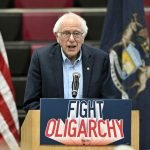
Is Venezuela Behind Gang Activity in America?
Posted in :
U.S. intelligence reports contradict Trump’s claims about Venezuelan involvement in gang activities targeting the United States, highlighting the dangers of political misinformation.
The contrasting claims regarding Venezuela’s involvement in gang activities in the United States, focusing on statements from US intelligence versus political rhetoric from former President Trump.
When former President Donald Trump alleged that Venezuela was directing a gang invasion into the United States, the news sent shockwaves through the political landscape. However, a recent assessment from the National Intelligence Council challenges this narrative, declaring that there is no evidence supporting such claims. This disparity raises questions about the accuracy of political statements and the implications they hold for international relations. As someone who follows these developments closely, it’s puzzling how divergent conclusions can emerge from the same set of facts. Let’s dive into the details behind these national security assertions and their wider implications.
The Intelligence Community’s Stance
The National Intelligence Council (NIC) recently released findings that have stirred discussions regarding US-Venezuela relations. These findings are significant. They challenge the narrative that has been prevalent in political circles, particularly among certain leaders. The NIC is tasked with analyzing threats to US security. Their assessments are crucial for understanding the dynamics at play.
Recent Findings from the National Intelligence Council
In a report published in 2023, the NIC stated that there is no credible evidence to support claims that Venezuela is orchestrating a gang invasion into the United States. This is a bold assertion. It directly contradicts statements made by former President Trump, who has suggested otherwise. The NIC’s findings are based on thorough intelligence gathering methods, which aim to separate fact from fiction.
- The NIC’s report emphasizes a lack of credible evidence against Venezuela.
- Public statements from intelligence officials reinforce this conclusion.
- These findings could reshape the narrative surrounding US-Venezuela relations.
Analysis of Intelligence Gathering Methods
How does the intelligence community gather information? It involves a complex process. Analysts sift through vast amounts of data, looking for patterns and credible sources. They utilize various methods, including:
- Human intelligence (HUMINT): Gathering information from people.
- Signals intelligence (SIGINT): Intercepting communications.
- Imagery intelligence (IMINT): Analyzing satellite images.
These methods are designed to provide a comprehensive view of potential threats. The NIC’s assessment suggests that their intelligence gathering has not revealed any direct involvement from Venezuela in orchestrating gang activities aimed at the US. This is a critical point. It highlights the importance of relying on factual data rather than political narratives.
Impact of These Findings on US-Venezuela Relations
The implications of the NIC’s findings are profound. They challenge the rhetoric that has been used to justify certain policies towards Venezuela. If the intelligence community asserts that there is no evidence of Venezuela directing a gang invasion, what does that mean for US foreign policy?
It raises questions about the motivations behind the claims made by political figures. Are they based on solid evidence, or are they part of a broader political strategy? The NIC’s report suggests that the latter may be true. As one expert analyst noted,
‘The role of intelligence is to separate fact from fiction.’
This statement underscores the necessity of grounding political discourse in reality.
Furthermore, the NIC’s findings could lead to a reevaluation of diplomatic relations. If Venezuela is not a direct threat, then what steps should the US take moving forward? Engaging in dialogue rather than confrontation might be a more effective approach. This could foster better relations and potentially lead to more stable outcomes in the region.
Public Statements from Intelligence Officials
Various intelligence officials have echoed the NIC’s findings. They have publicly stated that there is no evidence supporting claims of Venezuelan involvement in gang activities targeting the US. This consensus among intelligence professionals adds weight to the NIC’s report. It suggests a unified stance within the intelligence community regarding Venezuela’s role.
As the political landscape continues to evolve, these findings will likely play a crucial role in shaping future discussions. The intelligence community’s commitment to factual analysis is vital. It serves as a reminder that political narratives should be scrutinized and challenged when they lack evidence.
The NIC’s recent findings present a clear picture: there is no credible evidence linking Venezuela to a gang invasion of the US. This challenges existing narratives and opens the door for a more nuanced understanding of US-Venezuela relations. The intelligence community’s role in this process is essential, as they strive to provide clarity in a complex geopolitical landscape.
Political Rhetoric vs. Reality
Political rhetoric often paints a vivid picture. It can stir emotions, ignite passions, and sway public opinion. But how much of it reflects reality? This question is particularly relevant when examining the claims made by former President Donald Trump, especially regarding issues like Venezuela and immigration.
Examination of Trump’s Claims
During his presidency, Trump made numerous assertions about Venezuela. He suggested that the South American nation was orchestrating a gang invasion into the United States. This claim was alarming. It painted a picture of a country actively plotting against America. But was it true?
According to the National Intelligence Council, the answer is no. They stated that Venezuela is not directing any gang invasion into the U.S. This stark contrast between Trump’s rhetoric and the intelligence community’s findings raises important questions. How do such claims affect public perception?
- Trump’s statements often led to increased fears among the public.
- Many citizens began to associate Venezuela with crime and instability.
- This perception can influence policy decisions and public sentiment.
The Role of Misinformation
Misinformation plays a significant role in shaping political narratives. When leaders make bold claims, they can create a narrative that may not align with the facts. This divergence can lead to heightened tensions. It can also result in policy changes based on fear rather than reality.
For instance, Trump’s assertions about Venezuela prompted fears of crime and invasion. These fears were not just abstract. They had real-world implications. Public polling data showed that many Americans linked gang violence to immigration. This connection, however, was largely fueled by rhetoric rather than facts.
As the political commentator wisely noted,
‘In politics, sometimes truth takes a back seat to rhetoric.’
This statement rings true in many instances. When rhetoric overshadows truth, it can lead to misguided beliefs and actions.
Comparison of Political Statements with Intelligence Reports
Comparing political statements with intelligence reports is crucial for understanding the truth. In the case of Trump’s claims about Venezuela, the intelligence community provided a clear counter-narrative. They found no evidence supporting the idea that Venezuela was directing any gang invasion.
This discrepancy highlights a significant issue in political discourse. When leaders make statements that contradict established facts, it can create confusion. Citizens may struggle to discern what is true. This confusion can lead to a polarized society, where misinformation thrives.
Moreover, the impact of such rhetoric extends beyond mere words. It can shape public policy. For example, if a significant portion of the population believes that a foreign country is a direct threat, it may lead to increased military spending or stricter immigration policies. These decisions are often made in a climate of fear, rather than informed understanding.
The Impact on Public Opinion
Trump’s claims about Venezuela had a noticeable impact on public opinion. Many Americans began to view the country as a significant threat. This perception was not based on facts but rather on the rhetoric that dominated the political landscape.
Polling data indicated that a substantial number of people linked gang violence to immigration. This connection, while simplistic, was fueled by the narrative pushed by Trump and others. It illustrates how powerful rhetoric can shape beliefs, even in the face of contradictory evidence.
The examination of Trump’s claims about Venezuela reveals a troubling trend in political rhetoric. The gap between rhetoric and reality can lead to misinformation, fear, and misguided policies. As citizens, it is essential to critically evaluate the statements made by political leaders and seek out the truth. Only then can informed decisions be made.
Implications for US Security Policy
The landscape of US security policy is constantly shifting. Recent events have highlighted the conflicting narratives surrounding Venezuela and its alleged involvement in gang activities targeting the United States. On one side, US intelligence reports indicate that Venezuela is not orchestrating an invasion through gangs. On the other, former President Trump has made claims suggesting otherwise. This divergence raises critical questions about how such conflicting views can influence policy decisions.
Influence of Conflicting Views on Policy Decisions
When leaders present opposing narratives, it can create confusion. This confusion can lead to hasty policy decisions. For instance, if policymakers lean too heavily on political rhetoric rather than intelligence, they risk implementing misguided strategies. A clear understanding of the intelligence can lead to sound policy decisions. But how do we ensure that facts drive these decisions?
Consider this: if a government reacts impulsively to a narrative without verifying the facts, it may end up exacerbating the situation. This is particularly true in international relations, where the stakes are high. The implications of such decisions can be far-reaching, affecting not just the US but also its allies and adversaries.
Potential Risks of Overreacting to Political Narratives
Overreacting to political narratives can have dire consequences. It can lead to:
- Escalation of tensions: Misguided policies may provoke unnecessary conflict.
- Resource misallocation: Funds and efforts may be diverted to address non-existent threats.
- Loss of credibility: If the US acts on false premises, it risks losing trust among allies.
As the National Security Expert aptly stated,
‘Policies should be driven by facts, not political rhetoric.’
This statement underscores the importance of grounding decisions in reality rather than emotion or political gain.
Engagement Strategies Between the US and Venezuela
Moving forward, the US must adopt engagement strategies that prioritize dialogue and understanding. This is crucial in a time when misinformation can easily spread. Here are some potential strategies:
- Diplomatic channels: Establishing open lines of communication can help clarify intentions and reduce misunderstandings.
- Intelligence sharing: Collaborating on intelligence can foster trust and ensure both parties are on the same page.
- Public diplomacy: Engaging with the Venezuelan public can help counteract negative narratives and build goodwill.
These strategies can help mitigate the risks associated with political narratives. They can also pave the way for a more stable relationship between the US and Venezuela.
Historical Context of US-Venezuela Relations
To understand the current situation, it’s essential to consider the historical context of US-Venezuela relations. Over the years, these relations have been marked by tension and conflict. The evolution of security policies has often been reactive rather than proactive. Recent policy shifts regarding Latin American relations since Trump’s presidency have further complicated this dynamic.
In light of these complexities, the need for informed and rational approaches to security is more critical than ever. Policymakers must sift through the noise of political rhetoric and focus on the facts. This approach will not only enhance US security but also contribute to a more stable international environment.
In conclusion, the implications for US security policy in relation to Venezuela are profound. Conflicting narratives can lead to misguided policies if not carefully navigated. The risks of overreacting to political rhetoric are significant, and engagement strategies must be prioritized to foster understanding. As the landscape continues to evolve, it is imperative that US policymakers remain grounded in facts, ensuring that decisions are made with clarity and purpose. The future of US-Venezuela relations depends on it.
TL;DR: US intelligence says no connection exists between Venezuelan authorities and gang activities targeting the US, contradicting claims made by Trump regarding an invasion.
VenezuelaGangClaims, USSecurityIssues, TrumpVenezuelaStatements, USIntelligenceReport, GangInvasionInAmerica, GangViolence, IntelligenceCommunityFindings, PoliticalRhetoric, SouthAmericanPolitics, InternationalRelations
#USSecurityIssues, #USIntelligenceReport, #SouthAmericanPolitics, #PoliticalRhetoric, #TrumpVenezuelaStatements, #VenezuelaGangClaims, #GangViolence, #IntelligenceCommunityFindings, #GangInvasionInAmerica, #InternationalRelations,#Venezuela, #GangActivity, #USIntelligence, #DonaldTrump, #NationalSecurity, #PoliticalRhetoric, #FactCheck, #ForeignPolicy, #Immigration, #Misinformation

